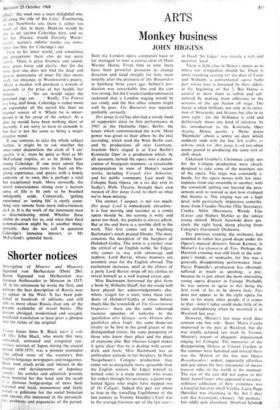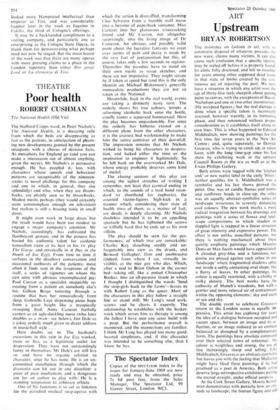ARTS
Monkey business
JOHN HIGGINS
Both the London opera companies have so far managed to steer a course clear of Hans Werner Henze. From time to time there have been powerful pressures to change direction and head straight for him, most notably after the premiere of Die Bassariden at Salzburg three years ago. Sellner's pro- duction was remarkably fine and the cast was strong, but the Covent Garden emissaries reckoned that a London staging would be too costly and the box otlice returns might well be poor. The Bassarids was rejected, probably correctly.
Der junge Lord has also had a sturdy band of supporters since its first performance in 1965 at the Deutsche Oper, Berlin, the house which commissioned the work. More power was given to their elbow by the ouG recording, which used the West Berlin cast, and by productions all over Germany. Joachim Herz staged it at East Berlin's Komische Oper in a production which, by all accounts, turned the opera into a denun- ciation of bourgeois manners—a reasonable interpretation in view of Henze's recent works, including Versuth iiher Schweine, and his public comments. Last week the Cologne State Opera, on a six day visit to Sadler's Wells Theatre, brought their own version of Der junge Lord, to show us what we've been missing.
The answer, I suspect, is not too much. Der junge Lord is immediately attractive: it is fast moving and succinct as a comic opera should be, the scoring is witty and never too thick, the pastiche is always adroit. But at the end there is a terrible chill in the work. This first comes out in Ingeborg Bachmann's much praised libretto. The story concerns the deception of the burghers of Hulsdorf-Gotha. The town is a-twitter over the arrival of an English noble, Sir Edgar, who comes to stay with entourage and nephew, Lord Barrat, whose manners are eccentric even for the English abroad. The excitement increases, until at the climax of a party Lord Barrat strips off his clothes to reveal himself as a well trained circus ape.
Miss Bachmann borrowed the plot from a book by Wilhelm Hauff, but she could well have placed her acknowledgements else- where. Gogol for a start, since these resi- dents of Hulsdorf-Gotha at times behave much like the townsfolk of The Government Inspector: there are the same rehearsed vacuous speeches of welcome to the 'gastlichen aber kleinett—nein, kleinett ober gastlichen alien Stade, the same desperate rivalry to be first in the good graces of the distinguished visitor, the same pomposity of those who know their place and the place of everyone else. But whereas Gogol makes it quite clear that he is dealing with scoun- drels and fools, Miss Bachmann has an ambivalent attitude to her burghers. In Hans Neugebauer's Cologne production they come out as marginally more agreeable than the English visitors. Sir Edgar himself (a mimed role) is a mute monster who issues his orders through his secretary, a gaunt top- hatted figure who might have stepped out of Dr Caligari. Indeed this pair are about as true to the travelling Englishmen of the last century as Tommy Handley's Funf was to the average German spy of the last war—
in Hauff 'Sir Edgar' was merely a rich and eccentric local.
There is little clue in Henze's music as to where our sympathies should lie. There is some ravishing scoring for the duet of Luise and Wilhelm, a conventional opera buffo pair whose love is thwarted by their elders. at the beginning of Act 2. But Henze is careful to show them as selfish and self- centred by making them oblivious to the screams of the ape beaten off stage. The music is often brilliant, not only in its imita- tion of Stravinsky and Strauss but also in its own right: yet the brilliance is cold and deliberately shuns any kind of emotion. In his introduction to the Komische Oper staging, Henze quotes a Heine poem 'Heimkehr' about a sentry on duty which suddenly ends with the line 'kit wolhe. er schosse mich toe. Der lunge Lord too often seems geared to producing the same sort of chill shock.
Ekkehard Grubler's Christmas cardy sets for the Cologne production were clearly designed to take some of the nastiness out of the opera. The stage was constantly a- bustle, for the opera moves with few inter- ruptions from one ensemble to another, with the townsfolk spilling out beyond the pros- cenium arch to remind us just how cramped this theatre is. The singing was on a high level, with particularly impressive contribu- tions from Claudio Nicolai (The Secretary). Cvetka Ahlin (Baroness), Wendy Fine (Luke) and Hubert Mohler as the simian young milord. Marek Janowski drew pre- cisely the right hard, sharp playing from Cologne's Gurzenich Orchestra.
The previous evening the orchestra had sounded in rather less good shape under the Opera's musical director, Istvan Kertesz, in Mozart's La clemenza di Tito. Perhaps the Harwich crossing was still fresh in the com- pany's minds, or stomachs, for this was a generally disappointing performance. Jean- Pierre Ponnelle's production has obviously suffered as much as anything: a pity. because he is just about the most interesting young opera director in Europe. Probably he was unwise to agree to this being the first work of his to be shown here. Tito does not appear to be the right opera for him, or for many other people, if it comes to that—John Copley could make little of its static attitudinising when he mounted it at Wexford last year.
However. Mozart's last stage work does contain one fine role: Sesto. Maria Casula impressed in the part at Wexford, but she was totally eclipsed last week by Yvonne Minton's stream of eloquent, impassioned singing for Cologne. The memories of the disappointing Orfeos at Covent Garden in the summer were banished and instead there was the Minton of the fine new Decca Rasenkavaller: ardent, apparently effortless and just about the best interpreter of mezzo travesti roles in the world at the moment. The rest of the cast did not aspire to this level. Janet Coster. who appeared in an extra- ordinary collection of fiery costumes, was a forceful but over-shrill Vitellia. Lucia Popp (Servilia) was charming in the Act 1 duet with Ilse Gramatzki (Annio). 'Ah perdona'. but oddly pale elsewhere. Manfred Schmidt looked more Hampstead intellectual than emperor as Tito, and was considerably happier later in the week as Jaquino in Fidelio, the third of Cologne's offerings.
It may be a backhanded compliment to a visiting company, and particularly one as enterprising as the Cologne State Opera, to thank them for demonstrating what perhaps need not now be staged. But the main lesson of the week was that there are many operas with more pressing claims to a place in the London repertory than either Der lunge Lord or La clemenza di Tito.



















































 Previous page
Previous page